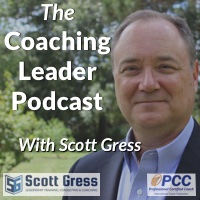
Things needed to change. John was the lead pastor of a church that was nearing 65 years old. The church had grown during the years where people were moving to the new new suburbs of the city. But that was a long time ago. Their context is different now. The members now seemed to commute to church from further away - when they even attended. They were starting to be an aging congregation with little in the way of visitors. Things were slipping. On top of that John was frustrated with his church, his staff and his lay leaders. He saw inconsistent leadership, sloppy execution, people who were less than fully engaged and not a lot of joy. It was tough to get anyone on the same page. It was tough to see any traction in the initiatives that were tried. It seemed like they were getting nowhere. It was frustrating and demoralizing. At staff meetings and council meetings they talked about how important these things were and it just didn’t seem to make any difference. John felt like he had lost control.
So what is in control? Well, certainly God is in control. He is the source of grace and peace as well as the strength to face a new day, even when it is discouraging. Just ask Jeremiah. Put another way, our attitude should be like Christ Jesus (Phil 2:5). In addition, we need to be observant and self aware. Then act on that insight and awareness in light of our leadership challenges and the truth and promises of Jesus.
The reality is that John’s congregation is like many churches in America. Those congregations grew almost in spite of themselves during a time when church attendance was more normal behavior. So as the suburbs developed and people moved in, those churches grew. There was a positive attitude. The pastor could be the pastor and the people could worship and together they could be the church. They would put on socials, some activities, conduct classes for children and adults and the life of the church, barring any scandals or internal squabbles, would prosper. Churches were built, parochial schools were started and things got done. The way of “doing church” by and large matched the context in which they found themselves.
You might respond that your church is still at that place. “We are still a church that is largely positive and getting things done.” Sure. That may very well be true. To an extent. But look at your crowd. If the average age is over sixty, or even seventy, then your church is slipping into being too comfortable within a context that has probably changed around you. In other words, your people are still the same, they do not represent your context anymore, and they are getting older. That means there will come a day when the numbers and the offerings and the hands to serve will begin to shrink if they haven’t already. When you notice those things then the reality will begin to come into focus that you are avoiding engaging the world around you. Some will shout magic bullets like a younger pastor, a contemporary service, or some other quick fix. But it is not that simple. Others will say we just need to tighten our belts. But how long will that work? Anger, frustration, sadness and discouragement will likely descend upon the church. Something has to change. But what?
The answer goes much deeper that the quick fix. Much deeper. The context has changed dramatically and the way of “doing church” is now maladapted to the present context. Please don’t misunderstand. This doesn’t mean that there needs to be a change in theology or water down what you do in terms of Bible study or worship. What it does mean is that the “in spite of ourselves” attitude that saw progress in the past is not enough when the context is a society that is trending away from regular worship and in many cases faith itself ( https://www.pewresearch.org/topics/religiously-unaffiliated/ ).
This requires some deep thinking and prayer. It begins with answering the question of focus. Why are we here and what does that require? The easy answer is to say we are here to preach the gospel and the like. Sure. But be more specific and precise. For John’s church their answer was that they are here to provide a community of faith for transplanted people moving out of the city or into the suburb. That may not have been articulated so clearly in the past but that was the assumption upon which the church was planted. In some cases whole churches moved away from the city center for just such a purpose! So now the question becomes, why do we still exist? If that purpose has shifted to be there to shepherd the aging who still attend, then fine. That’s honest. Just know there will be a time when your viability as a church will end. We see that more and more. Churches close or sell to another church all the time. Which begs the question, why can they do viable ministry but you can’t? Well, you can but it requires deep learning and the hard work of admitting that your assumptions about why you are “here” needs to adjusted as well as the behaviors that are required if you want to regain your vitality and health as a church. It means if you want to become more vital, then there needs to be a different intentional purpose than what is or was assumed.
So, talk candidly with mature members. Have an honest, adult conversation with a small group of calm, mature people in your church about your history, your assumptions, what you value (besides your Biblical teachings), often demonstrated by your behaviors and choices and what has changed. Together also deeply explore your context. Learn about the neighbors and the local residents and their attitudes and needs. Some on your team may be tempted to jump to solutions. But don’t you dare do it. Fight it with all your might! Magic bullets and quick solutions are tempting. The latest book or church fad may appear to be the answer. But most will only paper over your sense of guilt as you seek to do something, anything! After a time you will be back where you started yet more frustrated and deflated while not really getting to the heart of what is needed.
The heart of what is needed is a dependence upon God and the prayers to see what God sees. “Open your eyes and look at the fields! They are ripe for harvest” John 4:35. So spend a serious amount of time to really know the field of your community. Do your homework. Talk to people. Lots of people. Get curious. Listen deeply and learn all you can. Learn about their hopes and dreams and hurts and fears. Don’t get triggered to do what you’ve always done with pre-programed solutions. Instead, go back with your mature leaders and share those things. Pray for those with whom you spoke and pray for God to open your eyes. Consider how, who you are now, may be maladapted to love those people as you should. See the incongruence between what you have done, how you do it now and the harvest field within which God has placed you today. See the reality of your assumptions and what has since changed. Repent if necessary. Share the stories you’ve heard to more of your members and engage them in the listening, dialogue and prayer. Help them to see what is going on around them and the heart that God desires for you to have for them. Reserve judgment and reflect and learn. Then share with one another your new awarenesses and insights. Make note and take it to God. Receive God’s mercy and grace for your future. Then know this is only the beginning.
Scott specializes in leadership coaching, consulting, coach and leadership training. He is called by Lutheran Counseling Services and partners with the FL-GA District of the Lutheran Church and others as an independent contractor. Listen to The Coaching Leader podcast and contact Scott to continue the conversation or experience a free sample coaching session. scottgress@me.com or scottgress.com
"Coaching leaders of leaders"
Check out the: Coaching Leader Podcast!

